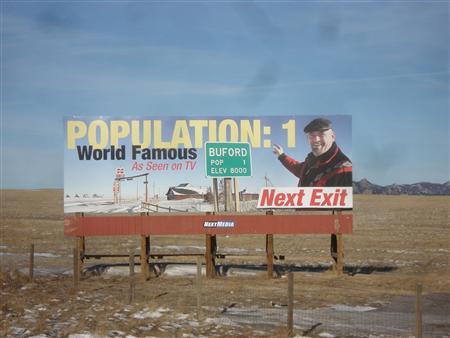By Laura Zuckerman
SALMON, Idaho (Reuters) –
Buford, Wyoming, the nation’s smallest town, will lose its long-time – and only – resident on Thursday when the outpost
along Interstate 80 is auctioned off to the highest bidder.

The minimum bid for Buford, 10-plus acres with a convenience store-cum-gas station situated between
the capital city of Cheyenne and Laramie, Wyoming, is $100,000 (62,870 pounds) for a sale to take place in town at noon local
time.
Buford is one of two tiny Western towns to be sold by owners whose spouses have died and whose adult children
have moved on.
Pray, Montana, population 8, is on the market for $1.4 million, a price realtors say is a steal for
property just north of Yellowstone National Park in the scenic Paradise Valley.
Both communities sprang to life amid
Western settlement in the late 19th and early 20th centuries when railroads brought people, supplies and prosperity to
frontier towns, some of which failed to flourish despite hype by land speculators.
“It’s a quintessentially American
story, with westward expansion and land speculation so tightly entwined and towns that boom and bust,” said Stephen Aron,
professor of history at University of California, Los Angeles and chair of the Institute for the Study of the American West
at the Autry National Center.
Don Sammons and his wife, Terry, set out from Los Angeles to a ranch near Buford in 1980
seeking a relaxed rural lifestyle.
The couple drove into the high-elevation town – then owned by an elderly rancher –
in a lipstick-red Lincoln Continental. The vehicle, ill-suited to the area’s deep snows and high winds, led locals to
surmise Sammons would leave within six months.
More than three decades later, Sammons is finally leaving and it is a
departure attended as much by anticipation as sadness, he said. The 61-year-old mayor, owner and sole inhabitant of Buford
intends to move to Colorado’s Front Range to live near his son.
“When the gavel drops … and the guy says, ‘sold,’
I might break down,” Sammons told Reuters. He bought Buford in 1992, six years after his wife died in 1986.
ONE-TIME
MILITARY FORT
The home of a one-time military fort designed to protect the building of the transcontinental railroad,
the site in the 1860s could boast as many as 2,000 residents. The population dwindled when the fort moved to Laramie and the
county seat changed from Buford to Cheyenne.
Advertisement
Today, Buford – named
after Civil War general and Union Army legend John Buford – is better known for its sale than its existence.
“I’ve
lived here for more than 30 years and nobody knew it. Now I’m leaving and the world knows it,” Sammons said about the
attention the auction has garnered.
Barbara Walker, 52, is selling the structures and land that make up Pray, Montana,
a five-acre town with a commercial building, trailer court and post office set against the backdrop of the Absaroka-Beartooth
Wilderness.
The area, known as Paradise Valley, once was home to cattle ranchers whose landholdings have since been
carved into exclusive developments where celebrity neighbours include actor Jeff Bridges.
Pray, named for a Montana
congressman, Charles N. Pray, was purchased by the family of Walker’s late husband in 1953.
Pray once relied for
outside income on trains carrying passengers to Yellowstone and on a highway that was twice relocated, sidelining the small
ranching community.
With no zoning, no covenants and no building restrictions, Pray could becoming anything from a
religious retreat to an artists’ colony, said Linda Niebur, broker with Mason and Morse Ranch Company, the Colorado real
estate firm marketing the town.
“You could build an eight-story high-rise if you want,” she said of the listing, which
has attracted dozens of inquiries from around the globe.
For Walker, a professional photographer whose husband
unexpectedly died in 2006, Pray represents a chapter in her life that is closing – and it is bittersweet.
“This is
some beautiful country,” she said of a property near the Yellowstone River’s world-class trout fishery and Chico Hot
Springs, a resort favoured by international tourists.
(Editing By Cynthia Johnston and Jackie Frank)



